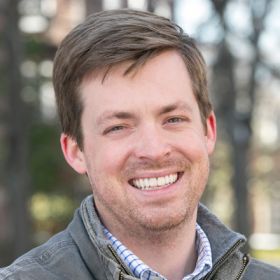Charley Cummings
MBA 2011
MBA 2011
“Agriculture offers the opportunity to be beneficial and regenerative, since grass-fed beef actually sequesters carbon. There’s the potential for a net-net positive benefit.”
An an MBA student, Cummings took advantage of several independent projects with clean energy startups, ultimately landing at Harvest Power Inc., a company that produces energy—and compost—from organic materials loaded into an anaerobic, concrete “digester.”
At Harvest Power, Cummings spent time traveling California’s Central Valley, meeting potential clients and seeing the good and bad aspects of large farming enterprises. “Although it’s the most efficient system in the world, there are a lot of things that are broken with our approach to producing meat,” he says. “That’s when I started getting interested in food as a business.”
Back in New England, his curiosity resulted in an insight. All too often, Cummings and his wife sacrificed convenience, price, transparency, or some combination of the three in their attempts to purchase sustainably-raised meat. In other words, farms were far away, prices often prohibitively high, and supermarket labels for organic beef didn’t tell the whole story of how the animal was raised—often crowded into a feedlot and fed organic corn. “My sense was that there were people out there who wanted to buy a product they could feel good about, and farmers who wanted to sell it—yet the means to make that happen was missing,” he recalls.
Walden Local Meat, which Cummings launched in 2013, buys pasture-raised animals from farmers within a 250-mile radius and coordinates transportation to an approved slaughterhouse, then back to its central facility in Burlington, Massachusetts. There, orders are packed and delivered to customers. “Agriculture as a sector is the second-largest emitter of carbon behind energy,” he says. “The great thing is that in addition to making systems more sustainable, agriculture also offers the opportunity to be beneficial and regenerative, since grass-fed beef actually sequesters carbon. There’s the potential for a net-net positive benefit.”
Cummings credits HBS with giving him the confidence to start his own business. “Listening to the stories entrepreneurs told us when they came back to campus was incredibly powerful,” he comments. “One alum said, ‘The greatest career risk you can take is staying somewhere where you’re not fulfilled or satisfied and not taking the risk of moving on or starting your own company.”
He also cites the powerful experience of completing three independent projects at clean tech startups under the supervision of faculty members Forest Reinhardt, Joe Lassiter, and Dick Vietor. “I found the companies that I was interested in and negotiated a consulting arrangement where I would receive course credit,” he explains. “It was a great way for me to explore the sector and get to know a company and its market.
“I used to be a very deliberate five- and ten-year plan sort of person,” Cummings adds. “But the choices you make just before and after HBS aren’t deterministic of what you’re going to do. So just close your eyes—and do it.”

